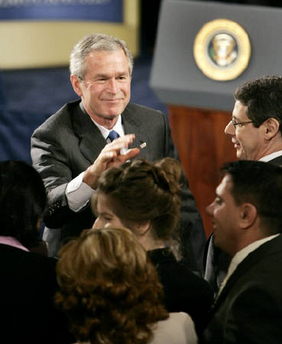Bush defending Iraq policy
(Reuters)
Updated: 2006-03-14 08:53
U.S. President George W. Bush, launching a drive to counter growing American opposition to the Iraq war, vowed on Monday "we will not lose our nerve" and accused Iran of helping foment violence in Iraq.
 |
| U.S. President George W. Bush greets supporters after speaking about the U.S. military involvement in Iraq while at the Dorothy Betts Marvin Theatre at the George Washington University in Washington, March 13, 2006. [Reuters] |
Stung by low approval ratings dragged down by pessimism over Iraq, Bush delivered the first in a series of speeches to convince Americans he has a strategy for victory, days before the third anniversary of the U.S.-led invasion of Iraq.
Bush spoke amid sectarian strife in Iraq that has raised fears of civil war, denting U.S. hopes for a troop drawdown anytime soon. Bombings in a Baghdad Shi'ite slum killed 52 people on Sunday.
"They're hoping to shake our resolve and make us retreat," Bush told a policy group at George Washington University. "They're not going to succeed."
But Bush, whose public credibility has also been hurt by a series of second-term troubles and missteps, offered no new plan for winning the war.
A CNN/USA Today/Gallup poll put Bush's job performance rating at 36 percent, a new low for the president in that survey and in line with other recent findings.
Bush's poll numbers are at the lowest point of his presidency, with up to two-thirds of Americans disapproving of his handling of Iraq, once among his strongest suits.
Bush insisted there had been progress training Iraqi forces to take over from the U.S. military and praised them for keeping things from spinning out of control after the February 22 bombing of a major Shi'ite mosque. But he acknowledged there was still plenty of work and "days of struggle" ahead.
Bush urged Iraq's leaders to "reach out across religious and sectarian lines" to form a unity government -- a process that has stalled amid the latest bloodshed.
Democratic Sen. Edward Kennedy (news, bio, voting record) of Massachusetts, a critic of the Republican administration, said instead of leading a "public relations blitz" Bush should bring Iraq's factions together for a summit to avoid a slide into civil war.
HOMEMADE BOMBS
While blaming sectarian violence on the "enemies of freedom" in Iraq, Bush also pointed the finger at Iran, saying some of the homemade bombs wreaking havoc in Iraq had been traced to its eastern neighbor.
Locked in a test of wills with Iran over its nuclear ambitions, Bush said: "Coalition forces have seized IEDs (improvised explosive devices) and components that were clearly produced in Iran."
The bombs have taken a heavy toll on U.S. forces as well as Iraqi civilians. There have been more than 2,300 U.S. military deaths since the 2003 invasion.
Bush said Iran had been responsible for some of the increasing lethality of attacks in Iraq.
"Such actions, along with Iran's support for terrorism and its pursuit of nuclear weapons, are increasingly isolating Iran," he said. Iran has denied meddling in Iraq and says its nuclear program is strictly for civilian purposes.
U.S. officials have previously accused predominantly Shi'ite Iran of giving training and weapons to Shi'ite militias operating in Iraq -- charges rejected by Iran's leaders.
While taking a mostly positive view of Iraqi forces, Bush said police were lagging behind the army in training and there had been reports of infiltration of some units by Shi'ite militias -- a problem he said was being corrected.
But Bush gave no sign of when the 132,000 U.S. troops in Iraq would start coming home. "We will not lose our nerve," he said in the speech to be followed by two more addresses this month and possibly more in April.
In response, House of Representatives Democratic leader Nancy Pelosi of California urged Bush to "provide a strategy to bring our brave men and women home safely and soon."
Bush made a similar public relations push in December seeking to shore up support for the war, which was launched three years ago for the stated purpose of ridding Iraq of weapons of mass destruction. No such weapons were found.











